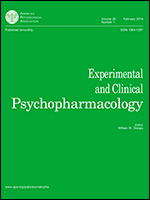
“Cannabis exerts an indirect effect on dopamine (DA) output in the mesolimbic projection, a circuit implicated in reward processing and effort expenditure, and thus may be associated with aberrant effort-based decision making. The “amotivation syndrome” hypothesis suggests that regular cannabis use results in impaired capacity for goal-directed behavior. However, investigations of this hypothesis have used divergent methodology and have not controlled for key confounding variables.
The present study extends these findings by examining the relation between cannabis use and effort-related decision making in a sample of college students. Cannabis using (n = 25; 68% meeting criteria for Cannabis Use Disorder) and noncannabis using (n = 22) students completed the Effort Expenditure for Rewards Task (EEfRT). In generalized estimating equation models, reward magnitude, reward probability, and expected value predicted greater likelihood of selecting a high-effort trial. Furthermore, past-month cannabis days and cannabis use disorder symptoms predicted the likelihood of selecting a high-effort trial, such that greater levels of both cannabis use days and symptoms were associated with an increased likelihood after controlling for Attention Deficit/Hyperactivity Disorder (ADHD) symptoms, distress tolerance, income, and delay discounting.
The results provide preliminary evidence suggesting that college students who use cannabis are more likely to expend effort to obtain reward, even after controlling for the magnitude of the reward and the probability of reward receipt. Thus, these results do not support the amotivational syndrome hypothesis. Future research with a larger sample is required to evaluate possible associations between cannabis use and patterns of real-world effortful behavior over time.”
https://pubmed.ncbi.nlm.nih.gov/35084912/
“Cannabis use is becoming increasingly tolerated, both culturally and legally; yet, the risks associated with cannabis use are still unclear. There is a perception among the general public that cannabis leads to amotivation and diminished effortful behavior. Our results do not support the amotivational hypothesis but, instead, that cannabis use is associated with a greater likelihood of selecting high effort trials.”
